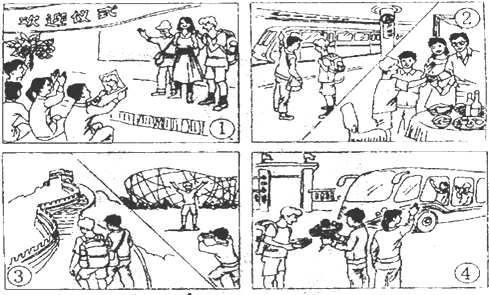题目内容
20.-Excuse me,visiting hours are over.It's time for you to leave.-I'm sorry,I didn't know the time or I ______ earlier.( )
| A. | will leave | B. | would leave | C. | had left | D. | would have left |
分析 -对不起,参观时间已到,你该走了.
-不好意思,我不知道时间到了.要不然我会早点离开的.
解答 答案:D
句意表达的是相反假设,要用虚拟结构;句中or相当于一个条件句if I had known the time;句意表达的是对过去事实的相反假设,主语要用情态动词加完成时态.故选D.
点评 虚拟语气是表示与事实相反的假设,构成方式有:对现在或将来,条件句中用一般过去时态,主语用情态动词加动词原形;对过去,条件句中用过去完成时态,主语用情态动词加完成时态.学习时,要牢记构成方式.

练习册系列答案
 名师指导期末冲刺卷系列答案
名师指导期末冲刺卷系列答案 开心蛙口算题卡系列答案
开心蛙口算题卡系列答案
相关题目
11.Man must keep in mind that it will be years ______ the earth recovers from the damage he makes to it.( )
| A. | when | B. | before | C. | since | D. | until |
15.Since the end of the war,many of the priceless antiques ______ to their rightful owners.( )
| A. | have returned | B. | had returned | ||
| C. | had been returned | D. | have been returned |
3.Research has shown that two-thirds of human conversation is taken up not with discussion of the cultural or political problems of the day,not heated debates about films we've just watched or books we've just finished reading,but plain and simple(51)C.
Language is our greatest treasure as a species,and what do we(52)B do with it?We gossip.About others'behaviour and private lives,such as who's doing what with whom,who's in and who's out-and why; how to deal with difficult(53)A situations involving children,lovers,and colleagues.
So why are we keen on gossiping?Are we just natural(54)D,of both time and words?Or do we talk a lot about nothing in particular simply to avoid facing up to the really important issues of life?It's not the case according to Professor Robin Dunbar.In fact,in his latest book,Grooming,Gossip and the Evolution of Language,the psychologist says gossip is one of these really(55)A issues.
Dunbar(56)B the traditional view that language was developed by the men at the early stage of social development in order to organize their manly hunting activities more effectively,or even to promote the exchange of poetic stories about their origins and the supernatural.Instead he suggests that language evolved among women.We don't spend two-thirds of our time gossiping just because we can talk,argues Dunbar-(57)C,he goes on to say,language evolved specifically to allow us to gossip.
Dunbar arrived at his cheery theory by studying the(58)D of the higher primates(灵长类动物)like monkeys.By means of grooming--cleaning the fur by brushing it,monkeys form groups with other individuals on whom they can rely for support in the event of some kind of conflict within the group or(59)A from outside it.
As we human beings evolve from a particular branch of the primate family,Dunbar (60)C that at one time in our history we did much the same.Grouping together made sense because the bigger the group,the greater the (61)D it provided; on the other hand,the bigger the group,the greater the stresses of living close to others.Grooming helped to (62)D the pressure and calm everybody down.
But as the groups got bigger and bigger,the amount of time spent in grooming activities also had to be(63)B to maintain its effectiveness.Clearly,a more (64)B kind of grooming was needed,and thus language evolved as a kind of vocal(有声的)grooming which allowed humans to develop relationship with ever-larger groups by exchanging information over a wider network of individuals than would be possible by one-to-one (65)C contact.
Language is our greatest treasure as a species,and what do we(52)B do with it?We gossip.About others'behaviour and private lives,such as who's doing what with whom,who's in and who's out-and why; how to deal with difficult(53)A situations involving children,lovers,and colleagues.
So why are we keen on gossiping?Are we just natural(54)D,of both time and words?Or do we talk a lot about nothing in particular simply to avoid facing up to the really important issues of life?It's not the case according to Professor Robin Dunbar.In fact,in his latest book,Grooming,Gossip and the Evolution of Language,the psychologist says gossip is one of these really(55)A issues.
Dunbar(56)B the traditional view that language was developed by the men at the early stage of social development in order to organize their manly hunting activities more effectively,or even to promote the exchange of poetic stories about their origins and the supernatural.Instead he suggests that language evolved among women.We don't spend two-thirds of our time gossiping just because we can talk,argues Dunbar-(57)C,he goes on to say,language evolved specifically to allow us to gossip.
Dunbar arrived at his cheery theory by studying the(58)D of the higher primates(灵长类动物)like monkeys.By means of grooming--cleaning the fur by brushing it,monkeys form groups with other individuals on whom they can rely for support in the event of some kind of conflict within the group or(59)A from outside it.
As we human beings evolve from a particular branch of the primate family,Dunbar (60)C that at one time in our history we did much the same.Grouping together made sense because the bigger the group,the greater the (61)D it provided; on the other hand,the bigger the group,the greater the stresses of living close to others.Grooming helped to (62)D the pressure and calm everybody down.
But as the groups got bigger and bigger,the amount of time spent in grooming activities also had to be(63)B to maintain its effectiveness.Clearly,a more (64)B kind of grooming was needed,and thus language evolved as a kind of vocal(有声的)grooming which allowed humans to develop relationship with ever-larger groups by exchanging information over a wider network of individuals than would be possible by one-to-one (65)C contact.
| 51.A.claim | B.description | C.gossip | D.language |
| 52.A.occasionally | B.habitually | C.independently | D.originally |
| 53.A.social | B.political | C.historical | D.cultural |
| 54.A.admirers | B.masters | C.users | D.wasters |
| 55.A.vital | B.sensitive | C.ideal | D.difficult |
| 56.A.confirms | B.rejects | C.outlines | D.broadens |
| 57.A.for instance | B.in addition | C.on the contrary | D.as a result |
| 58.A.motivation | B.appearance | C.emotion | D.behaviour |
| 59.A.attack | B.contact | C.inspection | D.assistance |
| 60.A.recalls | B.denies | C.concludes | D.confesses |
| 61.A.prospect | B.responsibility | C.leadership | D.protection |
| 62.A.measure | B.show | C.maintain | D.ease |
| 63.A.saved | B.extended | C.consumed | D.gained |
| 64.A.common | B.efficient | C.scientific | D.thoughtful |
| 65.A.indirect | B.daily | C.physical | D.secret |
